Blowing Smoke or Blowing Laws – The Legality of THC Vape Cartridges Explained
Navigating the Complex World of THC Vape Cartridges
Are THC vape cartridges legal? The answer depends on several key factors:
| Factor | Legality Status |
|---|---|
| Federal Law | Marijuana-derived THC vape cartridges with >0.3% Delta-9 THC are federally illegal (Schedule I) |
| Hemp-Derived Products | Cartridges with ≤0.3% Delta-9 THC are federally legal under the 2018 Farm Bill |
| State Laws | Varies widely: 21 states allow recreational use, 37 states permit medical use |
| THC Type | Delta-8, Delta-9, THCa have different legal statuses depending on source and concentration |
| Possession Location | Even in legal states, possession can be illegal in certain zones (schools, federal property) |
The legality of THC vape cartridges creates significant confusion for consumers across America. While the 2018 Farm Bill created a pathway for hemp-derived products containing no more than 0.3% Delta-9 THC, marijuana-derived cartridges remain federally illegal as Schedule I controlled substances. This creates a complex patchwork of regulations where a product that's perfectly legal in one state could result in felony charges just across the state line.
"We'll be blunt: No, recreational THC vape pens are illegal in Texas," states a Texas attorney's warning, highlighting how possession of less than 1 gram can result in a state jail felony with penalties of 6 months to 2 years imprisonment and up to $10,000 in fines. Meanwhile, in states like Colorado or California, similar products are sold openly in licensed dispensaries.
Adding to the complexity, there's the matter of THC type. Delta-8 THC products have emerged as a popular "legal alternative" due to a Farm Bill loophole, while THCa vape cartridges exist in a gray area because THCa converts to Delta-9 THC when heated - potentially making a "legal" purchase illegal once used.
I'm Max Shemesh, CEO and founder of Aventus8, with extensive experience navigating the complex regulatory landscape of THC vape cartridges legal status across different states and at the federal level. My company specializes in providing compliant, high-quality cannabinoid products while helping businesses understand and steer these challenging regulations.
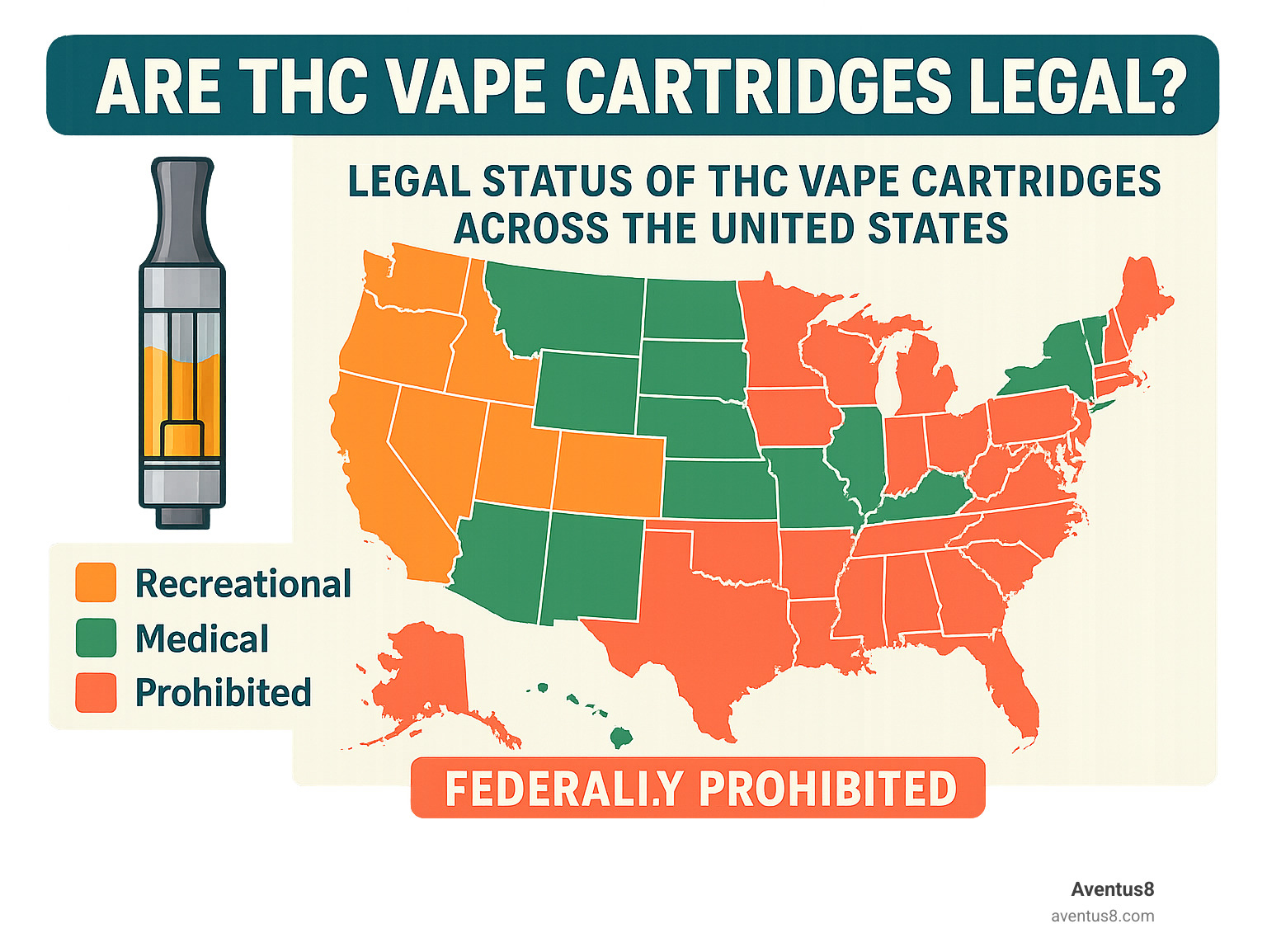
Know your are thc vape cartridges legal terms: - are legal thc vape cartridges safe - thc vape cartridge and pen - weed pens
What Exactly Is a THC Vape Cartridge? How It Works
Ever wondered what makes those sleek little THC vape pens work? Let's break it down in simple terms. A THC vape cartridge (or "cart" as the cool kids say) is essentially a small glass or plastic chamber filled with cannabis oil that attaches to a battery. Together, they create what we know as a vape pen. When you take a puff, the battery powers a tiny heating element called an atomizer that turns the oil into vapor instead of smoke.
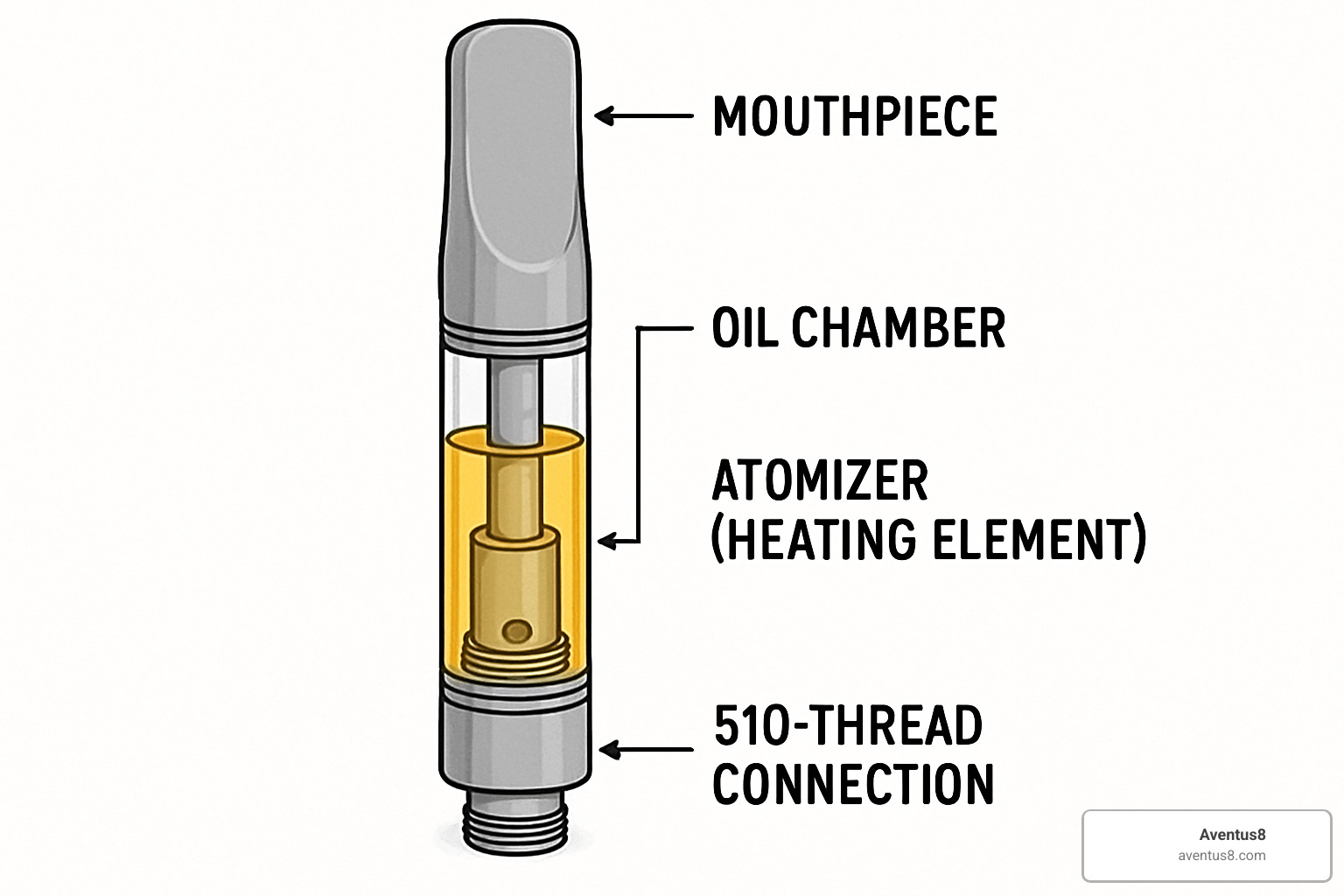
Most cartridges use what's called a "510-thread" connection – think of it as the universal charger of the vape world. This standard design fits most batteries on the market, though some brands do create their own proprietary systems (kind of like Apple vs. Android!). You'll typically find cartridges holding either 0.5 or 1 gram of cannabis oil, with prices ranging anywhere from $20 to $120 depending on quality, potency, and where you're shopping.
"Vape cartridges are one of the most convenient ways to consume concentrated THC," as one cannabis expert puts it. They deliver smooth, fast-acting effects and are particularly friendly for newcomers thanks to their simplicity and dosing precision.
The technology is beautifully simple: when you inhale (or press a button on some models), the battery activates the heating element, which warms a small amount of oil just enough to create vapor. This vapor travels through the mouthpiece and into your lungs, where the cannabinoids enter your bloodstream much faster than they would through edibles – giving you that quick onset of effects many users prefer.
Inside the Cartridge: Oil, Additives & Potency
What's inside that little glass tube makes all the difference – both for your experience and in the eyes of the law. The cannabis concentrates in vape cartridges pack a serious punch, typically containing between 40% and 95% THC. That's significantly stronger than traditional flower, which usually hovers around 17-18% THC.
To create these potent oils, manufacturers use extraction methods involving solvents like butane, CO2, or ethanol to separate cannabinoids from plant material. Quality matters enormously here – reputable producers thoroughly purge these solvents, while sketchy operations might leave harmful residual chemicals behind.
Some manufacturers add cutting agents to their oils, including propylene glycol (PG), vegetable glycerin (VG), MCT oil, and polyethylene glycol (PEG). These additives can affect everything from vapor production to how the oil flows through the cartridge.
The vaping world faced a serious wake-up call in 2019 when 68 people died and thousands became ill from vaping-related lung injuries. The CDC's investigation identified vitamin E acetate – an additive used primarily in black market THC cartridges – as the main culprit. This crisis highlighted why it's so important to purchase from legitimate sources rather than the guy selling carts out of his trunk.
Even legal vape cartridges aren't without concerns. Scientific research on vapor contaminants shows that metals from heating elements, including lead, chromium, and nickel, can be released during vaping. The higher the temperature, the more metals potentially make their way into the vapor you inhale.
The concentration of THC plays a crucial role in determining whether a cartridge is legal. Under federal law, the 0.3% Delta-9 THC threshold is what separates legal hemp-derived products from illegal marijuana products. However, this gets confusing when applied to concentrated oils, since the law references the dry weight of the original plant material – a detail that creates significant legal gray areas we'll explore more in the following sections.
Are THC Vape Cartridges Legal at the Federal Level?
The short answer: Most THC vape cartridges containing more than 0.3% Delta-9 THC are federally illegal, regardless of state laws.
The longer answer is a bit more complicated (isn't it always with cannabis laws?). Let's break down the key federal policies that impact whether are THC vape cartridges legal:
The Controlled Substances Act (CSA) is the big one. It places marijuana and its derivatives in Schedule I, alongside substances considered to have "no currently accepted medical use and a high potential for abuse." This federal prohibition blankets most THC vape cartridges derived from marijuana, regardless of what your state might allow.
Then in 2018, something interesting happened. The 2018 Farm Bill created a significant loophole by legalizing hemp, defined as cannabis containing no more than 0.3% Delta-9 THC by dry weight. This opened the floodgates for hemp-derived products, including CBD oils and, more controversially, Delta-8 THC products.
As one legal expert put it: "The Farm Bill legalized hemp and its derivatives, but it didn't specifically address concentrated products or alternative cannabinoids derived from hemp. This created a gray area that the industry quickly found ways to work within."
The DEA hasn't stayed silent on this issue. They've issued rules clarifying that synthetic THC remains controlled regardless of source. However, the legal status of naturally occurring cannabinoids derived from compliant hemp remains in a contested gray zone that many companies have been willing to explore.
If all that wasn't confusing enough, there's also the PACT Act (Prevent All Cigarette Trafficking Act), which was expanded in 2021 to include vaping products. This effectively banned shipping all vaping products through USPS, with very limited exceptions. FedEx, UPS, and DHL followed suit with similar restrictions on shipping THC vape products, regardless of their Farm Bill compliance.
"It still isn't a smart idea to mail THC products," as one vaping industry analyst bluntly puts it. "Heck, it's even becoming difficult to mail vape devices that don't contain anything at all!"
For the latest research on Farm Bill loopholes, check out this Washington Post analysis.
Are THC Vape Cartridges Legal — Key Federal Definitions
To understand whether are THC vape cartridges legal, you need to understand the different forms of THC and how federal law treats them:
Delta-9 THC is the primary psychoactive compound in cannabis and the main form regulated by federal law. Vape cartridges containing more than 0.3% Delta-9 THC are federally illegal outside of approved research contexts. This is the compound most people think of when they think of "getting high."
Delta-8 THC occurs naturally in cannabis in tiny amounts but can be created by chemically converting CBD through a process called isomerization. Because it can be derived from legal hemp, many vendors claim Delta-8 products are federally legal, though the DEA has raised eyebrows at this interpretation. To learn more about the science behind this process, check out this isomerization study.
THCa (tetrahydrocannabinolic acid) is the non-psychoactive precursor to Delta-9 THC found in raw cannabis. Here's where things get tricky: when heated (like when you vape it), THCa converts to Delta-9 THC through decarboxylation. Some clever vendors sell "THCa vape cartridges" claiming they're legal because they contain minimal Delta-9 THC before use – but this is legally questionable since the act of vaping converts THCa to Delta-9 THC.
A legal expert explains it best: "Sellers may lawfully market THCa vape pens under the premise that THCa isn't regulated like THC, shifting legal risk to buyers. Texas law focuses on the substance in its consumed form, so the conversion during use triggers controlled-substance rules."
This creates a situation where consumers can unknowingly commit a felony by using a product they purchased legally. Not exactly the surprise most people are looking for when trying a new vape cartridge!
50 States, 50 Rules: Navigating the Patchwork of Cartridge Laws
If you thought federal laws were confusing, just wait until you dive into state regulations! When it comes to THC vape cartridges, America truly is a patchwork quilt of wildly different approaches.
Recreational States (21): From the Pacific shores of California to the mountains of Colorado and the historic streets of Massachusetts, these states have acceptd adult-use cannabis. While they all permit THC vape cartridges for adults 21+, don't assume the rules are identical! Each state has its own unique approach to potency limits, testing requirements, and what warning labels must appear on packaging.
Medical States (37 + DC): These states recognize cannabis as medicine, but with strings attached. You'll need a qualifying medical condition and a state-issued card to legally purchase THC vape cartridges. What qualifies as a "medical condition" varies dramatically—some states limit access to patients with serious illnesses like cancer, while others include conditions like anxiety or chronic pain.
Prohibition States: The remaining holdouts maintain THC bans above the federal 0.3% limit, though many have softened their approach. Some have created special programs for low-THC/high-CBD products, while others have decriminalized possession of small amounts without fully legalizing.
Even within "legal" states, your local town or county might have banned cannabis sales entirely. I've seen plenty of customers drive an hour to the next county over just to make a legal purchase!
Let's look at three states to show just how drastically the rules can differ:
Texas takes an especially harsh stance on THC cartridges. That innocent-looking vape pen could land you in serious trouble: - Less than 1 gram (a typical cartridge size): State jail felony with 180 days to 2 years behind bars and up to $10,000 in fines - 1–3.99 grams: Third-degree felony (2–10 years, $10,000 fine) - 4–399.99 grams: Second-degree felony (2–20 years, $10,000 fine) - 400+ grams: First-degree felony (5–99 years or life, $50,000 fine)
Georgia allows hemp-derived products with ≤0.3% THC, but anything stronger is criminalized. That vape pen with standard potency THC oil? It could result in felony charges with significant prison time.
South Carolina permits THC oil only if levels stay under 0.3 percent. Cross that threshold, and you're looking at marijuana possession charges—illegal under state law.
Are THC Vape Cartridges Legal in My State? Quick Reference
When asking are THC vape cartridges legal where you live, here's what you need to consider:
First, does your state allow recreational cannabis? If yes, you're likely good to go as long as you're 21+ and buying from licensed sources.
No recreational program? Then check if you qualify for medical cannabis in your state. This typically requires a doctor's recommendation and registration with the state program.
If neither applies, look into whether your state has specific laws addressing hemp-derived cannabinoids like Delta-8 THC, which might provide a legal alternative (though this remains controversial).
Finally, know your state's THC concentration limits. Some states have created their own thresholds that differ from the federal 0.3% limit.
Here's a sobering comparison of what happens if you're caught with a typical 1-gram THC cartridge in three states:
| State | Legal Status | Penalty for 1g THC Cart |
|---|---|---|
| Texas | Illegal | State jail felony: 180 days–2 years, up to $10,000 fine |
| Georgia | Illegal | Felony: 1-10 years imprisonment |
| South Carolina | Illegal | Misdemeanor: Up to 30 days jail, $200 fine for first offense |
Some states have created "low-THC" medical programs that provide limited access. Texas, for example, allows medical cannabis products with up to 1% THC for qualified patients—still far below the 80-90% THC found in typical vape cartridges.
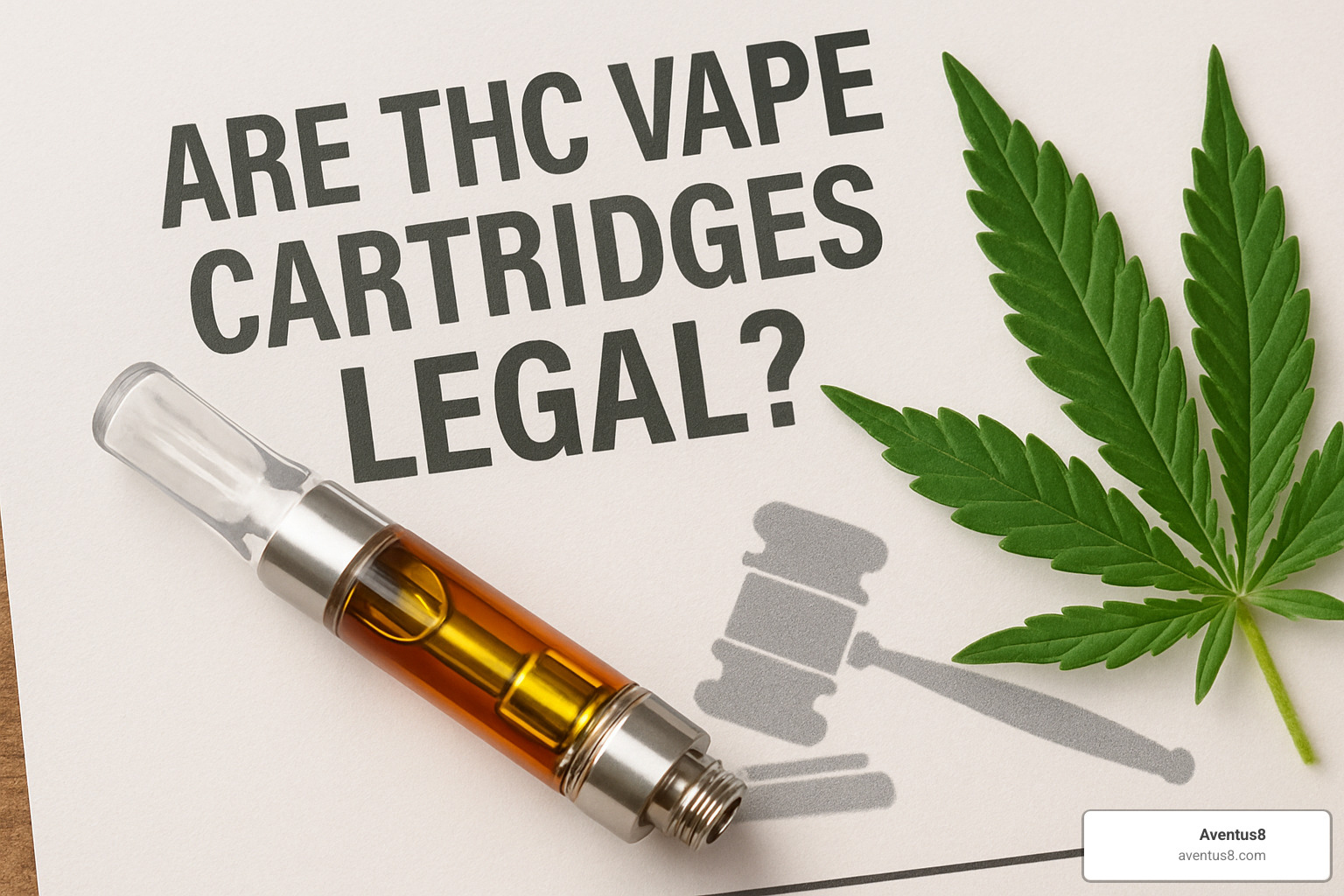
Possession, Purchase & Shipping: Staying on the Right Side of the Law
Navigating the THC vape cartridge landscape feels a bit like walking through a legal minefield, doesn't it? Let's break down what you need to know to stay safe and compliant.
First things first - age matters. Even in the most cannabis-friendly states, you'll need to be 21+ to purchase recreational THC vape products. Medical programs might have exceptions for younger patients, but you'll need proper documentation that would make a bureaucrat proud.
When shopping, always look for products with a Certificate of Analysis (COA). Think of this as your product's passport - it verifies what's actually in your cartridge and confirms it's free from nasty contaminants. For hemp-derived products claiming Farm Bill compliance, this documentation isn't just nice to have - it's essential.
"I always tell customers to treat their COA like a receipt for an expensive purchase," says an industry compliance expert. "You wouldn't throw away proof of purchase for a laptop, so why toss documentation that proves your cartridge is legal?"
That tempting display of Delta-8 or THCa vape products at your local gas station? Approach with caution. Convenience store availability doesn't guarantee legality. Many shop owners themselves don't fully understand the complex regulations they're navigating. As one cannabis attorney puts it: "Just because something's on a store shelf doesn't mean it won't land you in legal trouble."
Planning a road trip? Think twice before packing your vape. Crossing state lines with THC cartridges technically violates federal law, even when traveling between two legal states. While enforcement for personal amounts is rare, it's still a risk many don't realize they're taking.
The PACT Act has made shipping THC vape products nearly impossible through conventional carriers. FedEx, UPS, and USPS have increasingly strict policies, often refusing to carry even technically legal hemp-derived products. This shipping headache is why many consumers appreciate services like Aventus8's free shipping option for compliant products.
Practical Do's & Don'ts for Consumers
When it comes to THC vape cartridges, a little common sense goes a long way. Always buy from licensed dispensaries in legal states - they're regulated and tested for safety. Keep your products in their original packaging with all that boring-looking compliance information intact - it could save you a headache if questions arise.
Never mail or ship THC vape cartridges across state lines, regardless of what your friend says about doing it "all the time." And while it might be tempting to bring your favorite cart on vacation, TSA encounters can quickly escalate to local law enforcement involvement.
Store your products securely away from children and pets - not just for legal reasons, but because it's the responsible thing to do. And remember that even in legal states, public consumption often remains prohibited, so save your vaping for appropriate private spaces.
"The most common legal issues we see aren't from people intentionally breaking the law," notes a cannabis compliance expert. "They're from folks who simply didn't understand the rules in their area or thought that because something was sold openly, it must be legal to possess."
By staying informed about your local regulations and purchasing from reputable sources, you can enjoy these products while minimizing legal risks. And when in doubt, "are THC vape cartridges legal" is a question best answered by understanding your specific location's laws rather than general online advice.
Penalties, Medical Loopholes, and Age Limits: Consequences Explained
Let's be honest – the consequences for having THC vape cartridges in the wrong place can turn your life upside down, especially in states with strict prohibition laws.
Take Texas, for instance. Having just a tiny vape cartridge (less than one gram) could land you with a state jail felony. That means potentially spending 6 months to 2 years behind bars and paying up to $10,000 in fines. And if you're caught with larger amounts? The penalties get dramatically worse – possession of 400+ grams could actually result in life imprisonment.
Beyond jail time, a THC cartridge conviction can haunt you with: - Your professional license being revoked (goodbye career) - Becoming ineligible for college financial aid - Landlords turning you away - Job applications getting tossed in the rejection pile - Your driver's license suspended in certain states - Serious immigration problems if you're not a citizen
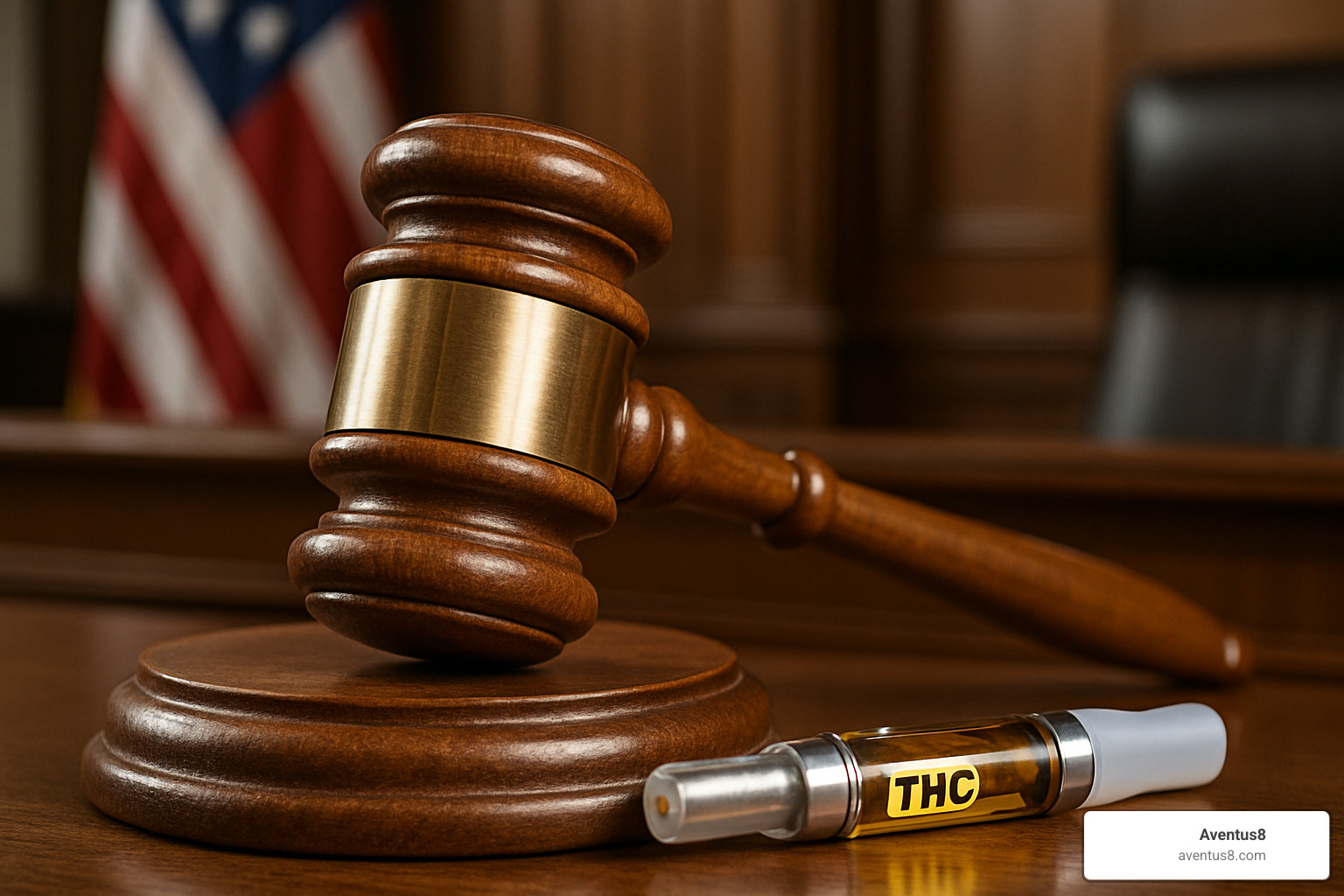
Medical marijuana programs do offer some protection, but it varies dramatically depending on where you live. Some states give qualified patients complete immunity from prosecution, while others only provide what's called an "affirmative defense" – something you can bring up at trial after you've already been arrested and charged.
Your medical card only shields you in the state that issued it. Cross state lines, and that protection vanishes completely. And remember, medical cards offer zero protection under federal law.
For younger users, enforcement has gotten increasingly strict. Schools now deploy sophisticated vape-detecting sensors and even drug-sniffing dogs to catch students with THC vape pens. Minors caught with these products often face juvenile justice involvement, mandatory drug education programs, and serious school disciplinary actions.
When a Legal Cart Becomes Contraband — Common Scenarios
Even when you're trying your best to follow the rules, it's surprisingly easy to find yourself in legal hot water. Here are real situations that happen all too often:
During traffic stops, police in prohibition states are specifically trained to spot cannabis vape cartridges. Just having one visible could give officers probable cause to search your entire vehicle. And even in legal states, driving under the influence remains a serious offense.
That THCa cartridge you bought at the convenience store that was marketed as "legal"? The moment you heat it and take a puff, the THCa converts to Delta-9 THC, potentially changing it into an illegal controlled substance right in your hand.
Going through airport security can be nerve-wracking if you've forgotten a cartridge in your bag. While TSA isn't actively hunting for drugs, if they spot what looks like a THC vape during screening, they'll typically call local police – whose response will depend entirely on the laws where that airport is located.
Trying to mail cartridges is particularly risky. Sending THC vape products through the mail, even between two legal states, violates federal law and could result in federal drug trafficking charges – which are far more serious than simple possession.
As one defense attorney I spoke with pointed out: "Cases built by law enforcement and prosecutors are not always as strong as they may first seem." If you do find yourself facing charges related to THC vape cartridges, consulting with an attorney who understands cannabis law could make all the difference.
How to Choose a Compliant and Safe THC Vape Cartridge
Finding a vape cartridge that's both legally compliant and safe for your health can feel like navigating a minefield. If you're in a state where THC vape cartridges are legal—either for recreational or medical use—knowing what to look for can save you from potential health risks and legal troubles.
When I'm helping customers choose products, I always emphasize that quality and compliance go hand-in-hand. A properly made cartridge isn't just safer—it's usually legal where permitted. Here's what matters most:
Third-Party Lab Testing is non-negotiable. Legitimate products come with comprehensive testing reports from independent laboratories that verify exactly what's in your cartridge. These tests should confirm cannabinoid content (crucial for legal compliance) and screen for nasty contaminants like pesticides, heavy metals, and leftover solvents from processing. Never take a company's word for it—always ask to see the actual Certificate of Analysis.
The hardware itself makes a huge difference in safety. Quality cartridges use materials like ceramic, glass, and medical-grade metals that won't leach harmful substances into your oil when heated. I've seen too many cheap cartridges with plastic components that contact the oil directly—these are best avoided completely.
When it comes to flavor and effects, natural terpenes are what you want to see. The best products use either cannabis-derived terpenes (for full-spectrum effects) or botanical terpenes for flavor, rather than artificial additives that might create harmful compounds when vaporized.
Speaking of harmful additives, there are several you should actively avoid. The 2019 vaping crisis taught us a hard lesson about vitamin E acetate, which should never be in your cartridge. Similarly, propylene glycol (PG), vegetable glycerin (VG), and polyethylene glycol (PEG) might be common in nicotine vapes, but they don't belong in cannabis products and can produce harmful compounds when heated.
Don't overlook the packaging either. Compliant products come in child-resistant packaging with batch numbers, manufacturing dates, and clear labeling of contents. This isn't just about following rules—it's about responsible companies that care about safety.
For more in-depth information about selecting quality vape cartridges and understanding the different options available, our ultimate THC product guide breaks down everything you need to know.
Quick Checklist Before You Buy
Before you hand over your hard-earned money for any THC vape cartridge, run through this simple compliance and safety checklist:
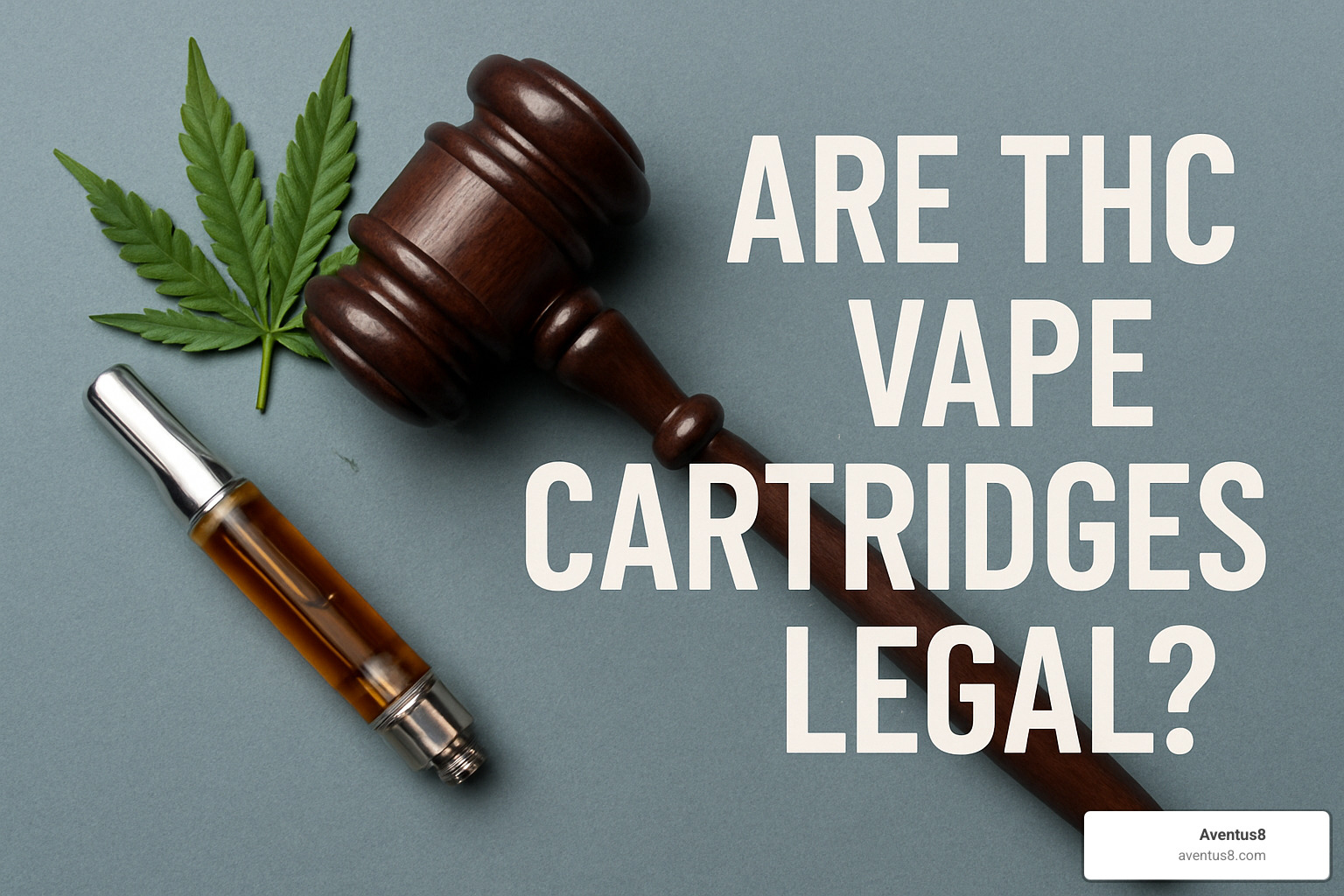
First, verify the product has a Certificate of Analysis that matches its batch number. This isn't just paperwork—it's your assurance that what's on the label matches what's in the cartridge. Next, confirm the Delta-9 THC content is within legal limits for your location. This is especially important if you're purchasing under Farm Bill compliance.
Make sure the product is made from legally sourced hemp if it's claiming Farm Bill compliance. The source matters legally, even if the end product seems identical. Always purchase from licensed dispensaries or reputable retailers—that gas station deal might seem tempting, but it's rarely worth the risk.
Take a moment to inspect the oil for clarity and proper consistency. It shouldn't be too thick (might contain thickening agents) or too thin (might contain excessive thinners). The packaging should include all legally required information, including warnings and cannabinoid content.
Quality matters, so verify the cartridge uses high-quality materials free from heavy metals. Lastly, check manufacturing and expiration dates to ensure freshness. Cannabis oil does degrade over time, affecting both potency and safety.
Frequently Asked Questions about the Legality of THC Vape Cartridges
Can I mail a hemp-derived Delta-8 vape to another state?
No, this isn't legally advisable, even if you're trying to do everything by the book. Even when the product contains less than 0.3% Delta-9 THC and is technically Farm Bill compliant, the PACT Act restrictions and carrier policies generally prohibit shipping any vape products through conventional mail services.
What makes this even trickier is that the receiving state might have specific bans on Delta-8 products that aren't in place where you purchased it. The potential consequences aren't minor either—penalties for illegal interstate shipping can include federal drug trafficking charges. It's simply not worth the risk.
Will a medical card protect me if my cartridge tests above 0.3% Δ9?
Your medical marijuana card works like a driver's license—it's only valid in the state that issued it and only for products purchased through that state's legal medical program. If you're in a medical state with a valid card, you can legally possess cartridges with THC levels approved by that state's program (which typically exceed the 0.3% limit).
However, your medical card offers zero protection if you travel to another state or for products purchased outside the regulated medical system. And here's something many people don't realize: federal law doesn't recognize state medical programs at all. So while state authorities won't prosecute you with a valid card, you're still technically violating federal law.
What happens if TSA finds a THC cart in my carry-on?
This scenario makes many travelers nervous, but here's the reality: TSA agents are looking for bombs and weapons, not your vape pen. However, if they happen to find what appears to be a THC vape cartridge during screening, their standard procedure is to refer the matter to local law enforcement.
What happens next depends entirely on where you are. In recreational states, adults 21+ may simply be allowed to continue with their flight if the amount is within legal limits—I've heard of this happening frequently in places like California and Colorado. In prohibition states, though, you could face criminal charges based on state law, potentially serious ones.
International travel with THC products is an absolute no-go. Many countries have much stricter drug laws than the US, and being caught with cannabis products could result in serious legal consequences including imprisonment. One cartridge simply isn't worth spending time in a foreign jail.
Knowing if are THC vape cartridges legal in your specific situation requires understanding both federal and state laws. When in doubt, it's always better to err on the side of caution.
Conclusion
The question "Are THC vape cartridges legal?" truly has no simple answer. Much like the complex plant it comes from, cannabis legality exists in a tangled web of contradictions and gray areas. Your cartridge's legal status depends on an intricate dance between federal and state laws, what's actually inside the oil, where you bought it, and where you happen to be standing when you possess it.
The 2018 Farm Bill created a narrow pathway for hemp-derived products containing no more than 0.3% Delta-9 THC to exist legally at the federal level. Yet many states have chosen to impose their own restrictions, creating a patchwork of regulations that can change dramatically as you cross state lines. Meanwhile, marijuana-derived products remain federally illegal regardless of what your state allows, leaving consumers caught between conflicting rules.
For your own protection, consider these essential guidelines:
Know your local laws inside and out before purchasing any THC product. What's perfectly legal in Colorado could land you in prison just one state over.
Purchase only from licensed, reputable sources that provide full lab testing and transparency about their products. Those gas station vapes might seem convenient, but they come with serious legal and health risks.
Keep all products in their original packaging with proof of legal purchase. This documentation can make all the difference if you're ever questioned about what you're carrying.
Never cross state lines with THC products, even between two legal states. Interstate transport technically falls under federal jurisdiction, where most THC products remain illegal.
Be especially cautious with products making claims about legal loopholes. Just because someone tells you their THCa cartridge is "technically legal" doesn't mean a judge will agree.
Here at Aventus8, we understand how frustrating this confusing landscape can be. That's why we're committed to offering compliant, high-quality products with complete transparency about what you're getting. We offer free shipping and a free gift on orders over $75 within the U.S., with no medical card required for our hemp-derived products that meet federal requirements.
The legal landscape for cannabis products shifts almost daily, with new legislation, court decisions, and regulatory interpretations emerging regularly. Staying informed about these changes isn't just smart—it's essential for anyone using or interested in THC vape cartridges.
For the most current information on our product offerings and how they comply with ever-changing regulations, visit our product collections.
Responsible cannabis use isn't just about how you consume—it's about making sure you're on the right side of the law while doing so. The legal landscape will continue evolving, and with proper education and caution, you can enjoy these products while minimizing your legal risk.
